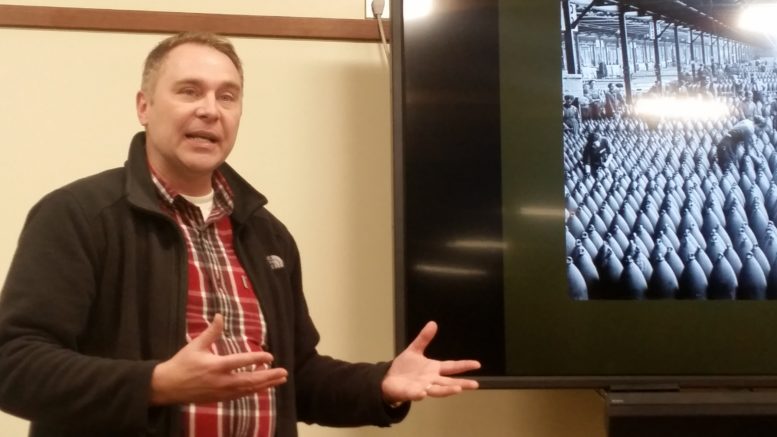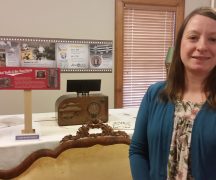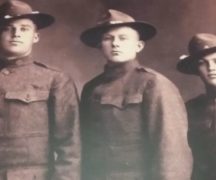By JAN LARSON McLAUGHLIN
BG Independent News
A century ago, on the eve of America’s involvement in World War I, people of Northwest Ohio were suspicious about their immigrant neighbors. Back then, it was Germans.
Many Germans settled in this region, bringing their hard work ethic with them. But as America sat on the sidelines of WWI, people became increasingly wary about the loyalties of their German neighbors.
Michael McMaster, education coordinator at the Wood County Historical Center, recently presented a program on “Henry County in the Great War: German-Americans, patriots, and loyalty, 1914-1918,” of which he has written in a book. The talk, given at Wood County District Public Library, was timely not only because of this being the 100th anniversary of the U.S. entering the war, but because the Wood County Historical Society recently opened an exhibit on the war and the local history involved.
Like Wood County, the next county to the west, Henry County, had a large German immigrant population in 1917. Some schools and churches still held classes and sermons in German. One newspaper still printed in German. And some civic organizations conducted meetings in the language.
All was fine as U.S. President Woodrow Wilson kept the nation from entering the war – and sold war goods to anyone who would buy. But that policy led to German sabotage of items that could be shipped over to aid the Allies.
“They blew up in America everything they could not buy,” McMaster said.
Gradually, Americans’ suspicions grew.
“There was unfair German spy hysteria in America,” McMaster said. “People began to wonder who their German neighbors were.”
Though no Northwest Ohio sites were sabotaged, some fires were initially blamed on possible German spies. There was a railroad roundhouse fire, that was later found to be caused by a hobo reckless with his matches, and a fire at a barn full of grain and equipment, that was later determined to be started by some boys smoking corn silk.
“They were generally loyal German-Americans in this region,” McMaster said. “The vast majority didn’t have great loyalty to the Kaiser.”
But the suspicions grew – with questions rising about some having too much German sentiment. And a small but feisty group of want-to-be politicians in Henry County latched onto that fear and stoked the flames.
In 1917, citizens could purchase “American Protection League” badges for 75 cents. Eleven Henry County men proudly wore the badges.
“You were supposed to go spy on your German neighbors,” McMaster said.
The League of American Patriots of Henry County was formed, vowing to crush pro-German feelings. “Disloyalty will not be tolerated,” one newspaper headline stated.
Patriotism was sometimes determined by the ability and willingness to buy war bonds. Those “slackers” who didn’t support the war financially sometimes found their barns painted yellow to show their cowardice.
A few families with very German sounding names changed them during this period.
Some schools stopped teaching the German language. “In Napoleon, they threw the books in the river. In Holgate, they burned the books,” McMaster said.
The “patriots” would shake down local businesses for financial support, he added.
The first “loyalty trial” was held against Bert Sharp, of Liberty Center. Sharp had been overheard at a bar criticizing the president because of the coal shortage. The “kangaroo court” found Sharp guilty and forced him to sit through a patriotism sermon, McMaster said.
“They couldn’t punish them, so they ruined their reputations,” he said.
The tide seemed to shift, however, when a German-American Loyalty Parade was held in Napoleon. Marchers carried outstretched bedsheets, as spectators threw in money for the American Red Cross and other causes.
According to McMaster, the more savvy politicians who had been sitting on the fence on the loyalty trials, noticed that the Germans far outnumbered the “league” members at the parade. Realizing their fates rested with the German voters, most of the politicians joined the German parade.
The last big effort by the league occurred in the nearby small town of West Hope. There are several versions of this tale, but the basic story is that the league taunted a German pastor Peter Peters, by trying to put American flags on his wagon. Peters was said to have been a mean man with a big club – so the league was unsuccessful.
Peters gathered other Germans from his congregation and decided to make a stand at his home in West Hope. The league members surrounded his parish, and Peters and his followers escaped through fields in the back.
Some politicians had seen enough of the league, and spoke out. One accused the group of “using patriotism as a cloak to accomplish political purposes, and a sorry mess you have made out of it.”
Voters felt the same, and when the league leader ran for prosecutor in the Republican primary, he received just 12 votes.
The newspapers ceased to publish league activities.
By time World War II came around, the German population was more settled, more were speaking English, and more were trusted.
“These type of shenanigans didn’t happen” during WWII, McMaster said.




